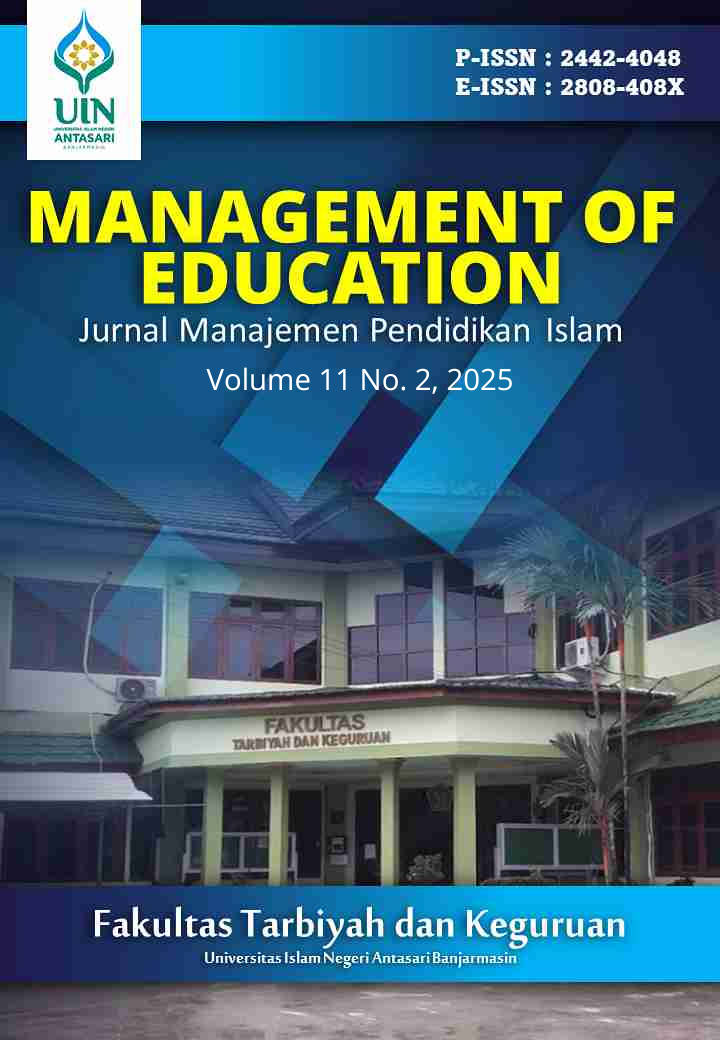Hidden Curriculum Strategy in the Formation of Tolerance: A Case Study at Tebuireng Islamic Boarding School
DOI:
https://doi.org/10.18592/moe.v11i2.17018Keywords:
Strategy, Hidden Curriculum, Tolerance Attitude, Islamic Boarding School, Tolerance Education, Character Building of Islamic Boarding School Students.Abstract
This study aims to analyze hidden curriculum strategies in fostering tolerance attitudes at Tebuireng Islamic Boarding School as a replicable model of tolerance education. Using a descriptive qualitative approach with a case study method, the research was conducted over six months, involving the deputy head of the boarding school, the academic council, the coordinator of mentors, mentors, and students as research subjects. The findings reveal that the hidden curriculum operates through three dimensions: structural via the Student-friendly Islamic boarding school program, interactional through dialogic communication between mentors and students, and cultural via institutional openness and diversification of extracurricular activities. Implementation follows a systematic pattern from the micro level (room) through amar ma'ruf nahi munkar, the meso level (boarding school) with social activities, to the macro level (community) through interfaith dialogue. Students active in extracurricular activities have higher tolerance levels. This study produces the Tri-Dimensional Hidden Curriculum concept, which integrates Jackson's theory with boarding school values, contributing theoretically and practically to the development of tolerant character education in Indonesia.References
Amnesti, M. E. P. & S. B. (2022). Konsep Toleransi Menurut Quraish Shihab. Jurnal Ilmu Syariah, 3(178–192), 2. https://jurnal.iaibafa.ac.id/index.php/minhaj/article/view/minhaj_juli22_05
Arifin, Z., & Turmudi, M. (2019). Character of Education in Pesantren Perspective: Study of Various Methods of Educational Character at Pesantren In Indonesia. Tribakti: Jurnal Pemikiran Keislaman, 30(2), 335-348. https://doi.org/10.33367/tribakti.v30i2.823
Arrajby, M. S. H., & Suwandi. (2022). Strategi Kepala Sekolah Dalam Mengembangkan Madrasah Literasi di Madrasah Tsanawiyah Negeri 3 Pamekasan. JM-TBI : Jurnal Manajemen Dan Tarbiyatul Islam, 3(1), 34–42. https://ejournal.unhasy.ac.id/index.php/jm-tbi/article/view/1878
Aziz, A. A. (2023). strategi kepala sekolah dalam pembentukan kedisiplinan pendidik dan peserta didik di mts at-taufiq bogem diwek jombang. Jurnal Pembelajaran Islam, 1(3), 777–789. https://doi.org/10.54437/iljjislamiclearningjournal.v1i3.1144
Azizah, utami yulianti. (2021). Pembentukan Sikap Toleransi Beragama [UIN Raden Intan Lampung]. https://repository.radenintan.ac.id/2370/
Bate’e, M., Anggela Hulu, D. C., & Lase, N. K. (2025). Pentingnya Karakter Di Lingkungan Kampus. Jurnal Ilmu Ekonomi, Pendidikan Dan Teknik., 2(1), 69–75. https://doi.org/10.70134/identik.v2i1.232
Dolgova, E. A., Korneenkova, A., Rumakina, A., & Shi, C. (2022). Student character building activities as a component of higher education primary educational program. SHS Web of Conferences, 137, 01010. https://doi.org/10.1051/shsconf/202213701010
Jackson, P. W. (1968). Life in classrooms. Rinehart and Winston. https://doi.org/10.1207/s15430421tip4104_1
Lesmana, R. P. D., & Syafiq, M. (2022). Fanatisme Agama dan Intoleransi pada Pengguna Media Sosial. Character : Jurnal Penelitian Psikologi, 9(3), 36–49. https://ejournal.unesa.ac.id/index.php/character/article/view/46146
Liu, J. (2010). On Strengthening CollegeMentor’s Role of Being"spiritual Teacher". https://doi.org/10.3969/j.issn.1009-7961.2010.06.018
Mara, E.-L., & Morar, L.-L. (2024). Mentor and Mentored Person. Relationships and Perspectives. International Conference Knowledge-Based Organization. 30 (2), 1–7. https://doi.org/10.2478/kbo-2024-0066
Nafiuddin, N., & Maharani, D. (2024). Toleransi Di Kalangan Santri Pondok Pesantren Kabupaten Bekasi. Refleksi, 23(1), 61–80. https://doi.org/10.15408/ref.v23i1.38237
Kress, J. S., & Elias, M. J. (2019). Nurturing Students’ Character: Everyday Teaching Activities for Social-Emotional Learning. https://www.amazon.com/Nurturing-Students-Character-Eye-Education/dp/0367190192
Rossouw & Frick. (2023). A conceptual framework for uncovering thehidden curriculum in private higher education. Cogent Education, 10. https://doi.org/10.1080/2331186X.2023.2191409
Putra, A. P. (2024). Pendidikan Toleransi Dalam Pembentukan Sikap Santri. Jurnal Pendidikan Agama Islam, 14(1). https://ejurnal.iiq.ac.id/index.php/qiroah/article/view/1616
Pratiwi, E. R. (2017). Pengaruh Hidden Curriculum Terhadap Pembentukan Karakter Siswa di SMP IT Masjid Syuhada’ Kotabaru Yogyakarta. Jurnal Pendidikan Agama Islam, 19(233–248.), 2. https://doi.org/10.14421/jpai.2017.142-04
Purwanto, E. (2022). Hidden Curriculum. ADIBA: Journal Of Education, 2(2), 231–237. https://adisampublisher.org/index.php/adiba/article/view/104
Siagian, S. (2004). Manajemen Strategik. Bumi Aksara.
Siraj, F., Majeed, A., Nur, R., Sundana, R., & Guntur, R. (2024). Strategi Meningkatkan Kualitas Pendidikan Menuju Indonesia Emas 2045 :Analisis Pandangan Akademisi. Jurnal Penelitian Ilmu Humaniora, 4(3), 82–89. https://doi.org/10.56393/antropocene.v4i3.2451
Sudirman, H. S. (2019). Strategi Implementasi Kurikulum: Suatu Kajian Perspektif Teori Di Sekolah Dasar. Adaara: Jurnal Manajemen Pendidikan Islam, 9(2), 936–951. https://doi.org/10.35673/ajmpi.v9i2.428
Sugiyono. (2019). Metode penelitian kualitatif, kuantitatif, dan R&D. alfabeta.
Sulistyo, W. & dkk. (2020). Implementasi Hidden Curriculum dalam Pembentukan Karakter Religius Peserta Didik di MTs Pondok Pesantren Modern. Manajemen Pendidikan Islam, 5, 2. https://jurnal.perima.or.id/index.php/JMI/article/view/385
Tsuraya, F. G., Rizkiani, S. T., & Kusumaningrum, H. (2024). Manajemen Strategi dalam Meningkatkan Pendidikan Yang Kuat. Jurnal Manajemen Pendidikan Islam, 2(1), 39–46. https://ejurnal.iainpare.ac.id/index.php/edium/article/download/9170/2163/
Umagap, S., Salamor, L., & Gaite, T. (2022). Hidden Curriculum ( Kurikulum Tersembunyi ) sebagai wujud pendidikan karakter (Studi pada SMK Al-Wathan Ambon ). Jurnal Kewarganegaraan, 6(2), 5329–5334. https://journal.upy.ac.id/index.php/pkn/article/view/3298
Downloads
Published
How to Cite
Issue
Section
License
Copyright (c) 2025 Mukhammad Ishomuddin, Abdullah Aminuddin Aziz

This work is licensed under a Creative Commons Attribution 4.0 International License.
Authors who publish with this journal agree to the following terms:
- Authors retain copyright and grant the journal right of first publication with the work simultaneously licensed under a Creative Commons Attribution 4.0 International that allows others to share the work with an acknowledgement of the work's authorship and initial publication in this journal.
- Authors are able to enter into separate, additional contractual arrangements for the non-exclusive distribution of the journal's published version of the work (e.g., post it to an institutional repository or publish it in a book), with an acknowledgement of its initial publication in this journal.
- Authors are permitted and encouraged to post their work online (e.g., in institutional repositories or on their website) prior to and during the submission process, as it can lead to productive exchanges, as well as earlier and greater citation of published work.









 This work is licensed under a
This work is licensed under a 